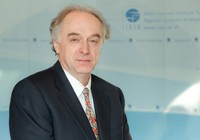01 February 2012
Water and climate expert to lead global research institute
Professor Kabat joins IIASA following a distinguished career in scientific research and research management. He retains a Professorship at the Earth System Science and Climate Change Group at Wageningen University and Research Centre in the Netherlands, of which he is the immediate past Chair.
“Pavel Kabat has an impeccable record both as a scientist and a science leader”, says Professor Peter Lemke, Chair of the IIASA Council. “He brings to IIASA expertise in many aspects of global change, specifically the interaction of humans with the natural environment – an interaction that is at the heart of some of the most intangible issues facing science and policy communities today, such as the sustainable management of food and water resources, and energy access, areas that are of strategic research importance to IIASA.”
“IIASA’s role as an international, interdisciplinary organization is to bring nations together to better define and address these issues from a scientific perspective, and importantly, to ensure these findings are accessible to decision-makers in government and industry. In Prof. Kabat we have a leader with the interdisciplinary knowledge, international perspectives, and the management expertise to ensure IIASA is able to maintain and grow what is a rather unique place in the international science community,” says Lemke. “On behalf of the IIASA Council, which represents the interests of the science academies and research organizations in nearly 20 nations around the world, I warmly welcome Prof. Kabat to IIASA.”
Prof. Kabat is well acquainted with IIASA, having collaborated with the Institute over a number of years, primarily on aspects of water, land and climate interactions and through his role in various international initiatives and assessments, such as the Intergovernmental Panel on Climate Change (IPCC) Assessment reports and the World Bank’s Millennium Ecosystem Assessment. With support from the European Commission and other large international agencies such as the National Aeronautics and Space Administration (NASA) Kabat also pioneered large-scale research on global change that has provided the foundation for a new generation of thinking in global change research.
“I look forward to working with IIASA staff and with the broad global network of scientists and decision-makers that IIASA, through its National Member Organizations and affiliations with the United Nations and other significant international and national organizations, has developed.
“These strong networks and a global approach place IIASA in a unique position to provide scientific leadership on very complex policy issues, such as global environmental change and human sustainability issues. But also short-term challenges such as food and water sustainability, or energy security - issues that must be tackled urgently. IIASA’s integrated systems approaches, linking all these issues, offer fresh, new perspectives on how to resolve some of these challenges,” says Prof. Kabat.
One example of this approach is the Global Energy Assessment (GEA), initiated and managed by IIASA, it is the largest and most integrated assessment of the global energy system ever undertaken, linking all aspects of energy, water, food, urban infrastructure, climate, land use, human health, to name just a few. Such a complex task could only be conceived by an organization like IIASA. The presentation by the President of the Czech Republic Václav Klaus at the IIASA organized meeting to discuss economic transition in Central and Eastern Europe is another current example of the breadth and depth of the work IIASA undertakes.
IIASA was established during the Cold War as a mechanism for building scientific collaborations between the East and the West. Today this collaboration also bridges North and South and IIASA memberships now involves all major regions of the world.
“I believe in the years ahead IIASA can build on this success, by extending our relationship to the Middle East and further strengthening our transboundary scientific collaborations in South East Asia, Central Asia, South America, and Africa.
“I also believe that Global Change research is on the verge of a complete transformation, one that will involve new methodological approaches and require new organizational structures. IIASA is well positioned to play a key role in this transformation and invites world - leading research funding and coordination agencies, such as those clustered under for the Belmont Group, to work together to enable and manage this transformation.
“These are exciting times and I look forward to being a part of this very dynamic organization and the opportunities that lie ahead,” concluded Prof. Kabat.
Commenting on the appointment the Governor of Lower Austria Dr Erwin Pröll described IIASA as one of the leading research organizations in Austria.
"The Province of Lower Austria is aware of the significance of international networks and is proud of its wide range of internationally recognized research activities. One of the leading research organizations in this context is IIASA. The Institute’s focus on innovative, interdisciplinary research and international collaboration serves as a platform for scientists and researchers throughout the world. The close collaboration of IIASA with other Austrian institutions and the international awareness of this Laxenburg-based Institute, also profiles Lower Austria as an important base for science and research. I am convinced that IIASA's new Director, Professor Pavel Kabat, will continue to grow on this success."
Prof. Kabat replaces outgoing Director Detlof von Winterfeldt who returns to the University of Southern California after leading IIASA over the past three years.
“Prof. von Winterfeldt has made an enormous contribution to IIASA, leading the organization through a strategic planning process, overseeing the initial implementation of a new 10 year plan and building our international memberships. On behalf of the IIASA Council I thank him for his valuable contributions and wish him well in his return to the US,” concluded Prof. Lemke.
Prof. Kabat becomes IIASA’s tenth Director since it was established in 1972.
More information


